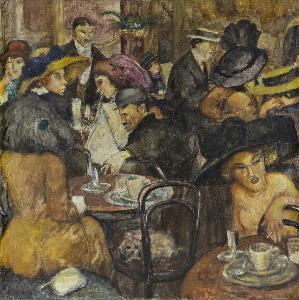Willy Gustav Erich Jaeckel
Willy Gustav Erich Jaeckel;Jaeckel
Place: Breslau
Born: 1888
Death: 1944
Biography:
Willy Gustav Erich Jaeckel was a German Expressionist painter and lithographer, born on February 10, 1888, in Breslau, Germany. He originally intended to become a forest ranger but poor health forced him to change his plans. Jaeckel studied at the art school in Breslau from 1906 to 1908, then enrolled at the Dresden Academy of Fine Arts under the direction of Otto Gussmann.
Early Career and Success
In 1913, Jaeckel moved to Berlin to work as a free-lance artist and became a member of the Berlin Secession in 1915. Four years later, he was elected a member of the Prussian Academy of Arts and became a teacher at the University of the Arts in 1925. His first successful painting was Kampf (Battle, or Struggle), a large canvas featuring a bellowing, muscular, naked man.
Notable Works and Awards
In 1928, Jaeckel was awarded the Georg-Schlicht-Preis for the "most beautiful portrait of a German woman". His work was part of the art competitions at the 1928 Summer Olympics and the 1932 Summer Olympics. Some of his notable works include Plowman in the Evening, meant to depict the Nazi concept of Blood and Soil.
Challenges and Legacy
Jaeckel was named an Associate Professor in 1933, but he was dismissed when the Nazis came to power. Many of his works survived the war only because the Nazi government removed them from Berlin. He lost his studio to a bombing raid in 1943 and was killed during another raid early the following year.
- Some of Jaeckel's works can be found at The Museum Collection Hugo Fischer (Bühl, Germany).
- More information about Willy Jaeckel can be found on Wikipedia.
- Jaeckel's paintings and pastels are also featured on Wikioo.org.
Jaeckel's legacy as a German Expressionist painter continues to be celebrated, with his works being exhibited in various museums and collections, including the Bröhan Museum. His story serves as an inspiration to artists and art lovers alike, showcasing the power of creativity and perseverance in the face of adversity.

